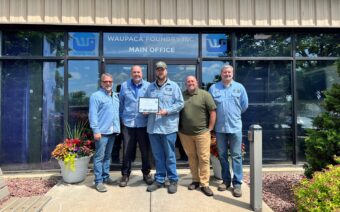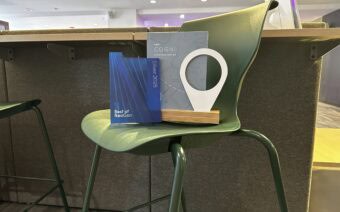
September 8, 2022
GREEN BAY – Not many positives can be said about the COVID-19 pandemic.
As some businesses were forced to close their doors or decrease production, however, Lanny Viegut, CEO of Carnivore Meat Company, said his company, which he founded in 2012, saw a gradual uptick in sales, sparking the need for an additional area facility.
With a 28-acre green field as a backdrop, the pet food manufacturer officially broke ground Aug. 8, on a new, 235,000-square-foot facility on Green Bay’s far east side.
Carnivore, which currently has its corporate offices in the I-43 Industrial Park, will build the plant at the northeast corner of Finger and Grandview roads, which Viegut said will allow the company to increase the production capacity of its ultra-premium freeze-dried and frozen raw pet foods.
“We are seeing exponential growth in demand for our Vital Essentials brand and started planning for this facility a little more than a year ago,” he said. “This groundbreaking marks an exciting new chapter for Carnivore as we ensure we have cutting edge technology and capacity to satisfy the desire for our branded products around the globe.”
A modest beginning
Viegut said the idea behind Carnivore Meat Company was born while on a walk with his wife in August 2012.
“I never envisioned it would become what it has,” he said.
Viegut said he likens Carnivore’s journey to that of a growing child.
“Carnivore was conceived Aug. 15, 2012, and after a short gestation period, we became a company on Oct. 2, 2012,” he said. “That was the springboard. We started with 25 employees.”

This is a rendering of what Carnivore Meat Company’s new facility will look like once completed in 2023. Schuh Construction Rendering
Viegut said as the company progressed into its “toddler years,” it began building freeze dryers.
“It became obvious to me freeze-dried pet food was the future,” he said. “Like a toddler, we stumbled a few times, but we got back up and kept going.”
Viegut said it wasn’t always easy.
“I remember going to the mailbox daily – it was a lottery to us – looking for checks so we could make payroll that week,” he said. “Soon, the checks started coming, and we grew. We moved out of our initial building and built the Ontario facility (located at 2878 Ontario Rd. in Green Bay).”
Viegut said as Carnivore moved into “grade school,” he realized there was a problem.
“That problem was me,” he said. “Every decision went through me – it’s a nice feeling to have that much to say, but we were growing. Upon that realization, I began building my leadership team.”
Viegut said Carnivore has long-been known for its innovation.
“We introduced 14 freeze-dried dog treats,” he said. “Our biggest sellers are freeze-dried minnows. It’s a case of, ‘What if and why not?’ We challenge ourselves to be different. The entire industry looks forward to seeing what we have planned.”
According to the company’s website (carnivoremeat.com), Carnivore has more than 100 product options, including complete diets, diced treats and treat bites.
Viegut said beef, chicken, turkey, rabbit, wild boar and salmon are popular treat bites.
In addition, he said Carnivore uses vendors from all over the country.
“We’re blessed to have many regional and local vendors who help us,” he said.
To keep up with demand, Viegut said the company underwent a major expansion in 2018.
“We added seven freeze dryers, which was a big deal,” he said.
The pandemic
Viegut said during the COVID-19 pandemic, Carnivore was able to weather the storm.
“We were blessed,” he said. “We’d been seeing steady growth in our company up until that point, and even when COVID hit, we still saw steady growth. We didn’t see a drastic drop or increase – it was steady.”
Viegut said pet ownership and pet adoption grew tremendously during the pandemic.
“One of the reasons we came through it okay was because of how diversified we are,” he said.
Viegut said also during this time, the China market opened up, which brought in a whole new area to supply.
“Carnivore has become one of the largest exporters of agricultural products in China,” he said. “That’s pretty cool.”
Fast-forward to July 2021, Viegut said the company began running out of space.
“There was a shortage of available warehouse space or buildings in Green Bay,” he said. “We then began the process of what this new facility could look like.”
Today, Viegut said Carnivore works with 7,000 stores and retailers in North America, along with 14 international markets around the globe.
“Despite our growth and success, we are keeping our main headquarters and business in Green Bay – we’re not leaving,” he said.
Viegut said part of that decision is because of the people.
“The people in Green Bay have a good work ethic,” he said. “I’ve been in other businesses/industries where we tried to open shops in other parts of the country that didn’t work. People here show up to work every day and care about what they do.”
Why freeze-dried?
Viegut said he’s been involved in the meat industry for most of his career, and freeze-dried pet food makes sense.
“As we put Carnivore together, the meat industry tied in with pets,” he said. “It fits like a glove.”
According to the company’s website, freeze-drying maintains the nutritional and structural integrity of the food, is safe and convenient for storage without refrigeration.
“It’s different from the traditional kibble you’ll find in the store,” Viegut said. “We’re trying to reassemble the prey as a dog or cat in the wild would do and wanted to create a prey diet. Our food is in a natural state – virtually identical to what pets would eat in the wild.”
Viegut said in the beginning, there was this perception that the ultra-premium products would be for people with a lot of discretionary income.
“We’ve learned every demographic – from the wealthy to the front-line folks, men, women – love their pets and treat them like family,” he said. “In the U.S., 78% of households own dogs.”
Once completed by the end of 2023, Viegut said the plant will be the largest freeze-dried pet food manufacturing facility in North America.
If you build it, they will come
Schuh Construction, headquartered in Seymour, will lead the charge as the project’s general contractor.
Working together since 2010, Viegut said Schuh and Carnivore have collaborated on 50 projects to support Carnivore’s growth and expansion over the years.
“As a long-time partner of Carnivore, we’re grateful and excited to leverage our expertise in the food and beverage industry to bring better vision to life,” Karl “Pudge” Schuh, vice president of Schuh Construction, said. “Lanny and his team have been great to work with, and we look forward to getting to work on the project.”
Schuh said the dimensions of the building will be about 300 feet by 1,000 feet, with 10,000 cubic yards of concrete required for the job.
“To put that in perspective, that’s about 1,100 truckloads,” he said. “Additionally, 2.9 million pounds of steel will be used. We’ll have 250 trades workers on this job, plus the truck drivers and local businesses who will supply materials.”
Advanced technology
Viegut said the facility’s state-of-the-art manufacturing area will feature high-speed automation designed and implemented by Gray Solutions, aimed at increasing production speed and efficiency.
“When completed, the new facility will house 36 custom-built, next-generation freeze dryers,” he said. “The new dryers – combined with the previously announced investment in Carnivore’s existing facilities earlier this year – will amount to a nearly six-fold increase in production capacity from the company’s 2021 production levels.”
Viegut said Carnivore recently bought a building near the company’s main facility on Ontario Road.
//s3.amazonaws.com/appforest_uf/f1662643703990x517877903466268800/richtext_content.webp
Lanny Viegut
“We’re in the process of putting those together and filling those with freeze dryers,” he said.
Viegut said the Ontario facility and the new structure in the Grandview Industrial Park will work hand-in-hand.
“The intent is to continue manufacturing in the other facility as well,” he said. “This is all on top of what we already do.”
Financial implications
Neil Stechschulte, development director for the City of Green Bay, said the project will be vital for Green Bay’s economy.
“We’ve been at this (with Carnivore) since August 2021,” he said. “We’ve had to do things like selling the property to Carnivore, establishing the zoning, reviewing the site and building plans, creating a new TID (Tax Incremental District) and approving a new street name.”
Stechschulte said meat processing is a $100 billion industry annually for the State of Wisconsin.
“That’s especially true of Northeast Wisconsin,” he said. “Carnivore will also serve as an anchor tenant to our new Grandview Industrial Park. This project will allow the industrial park to invest in the initial infrastructure to bring in more tenants.”
Stechschulte said the 150 new jobs coming to the plant will create $10 million in annual salary.
“It will also add $35 million in the tax base to the local community,” he said. “Because Carnivore is homegrown and right here in Green Bay, it makes it even better. This is going to be a world-class facility and will be a vital part of Green Bay’s economy for years to come.”
Stechschulte said Carnivore has enough customer potential to expand even more in the future.
“Hopefully, this is the first step,” he said.
Stechschulte said Carnivore could receive 20% of the money generated through a new TID each year for potentially 20 years.
Green Bay Mayor Eric Genrich said Carnivore is a Green Bay story.
“It’s homegrown,” he said. “It’s a fantastic day for everyone involved.”
Genrich said the land, as it currently sits, doesn’t give the city any financial benefit, but it soon will.
“As Director Stechschulte said, this project, in and of itself, gives the industrial park a chance for growth – that’s a strategic interest of ours,” he said. “It’s tough to get that first domino to fall, so this is a huge domino for us.”
Inviting workplace
Viegut said Carnivore employs more than 200 people in four locations throughout the Greater Green Bay area, with plans to add 150 new jobs over the next five years.
“The new campus will include a 27,000-square-foot office space designed with sustainability and pets in mind,” he said. “Office spaces will be constructed with sustainable materials and energy-saving features throughout. The facility will have a dog run, dog wash stations and other pet amenities.”
Viegut said part of growing as a company includes creating an environment people want to work in.
“We’ve always had a pet-friendly culture, and this new facility will enhance that offering,” he said.
 It’s pedal to the metal for Robinson, Inc.
It’s pedal to the metal for Robinson, Inc. The importance of the entire fish – scales and all
The importance of the entire fish – scales and all








